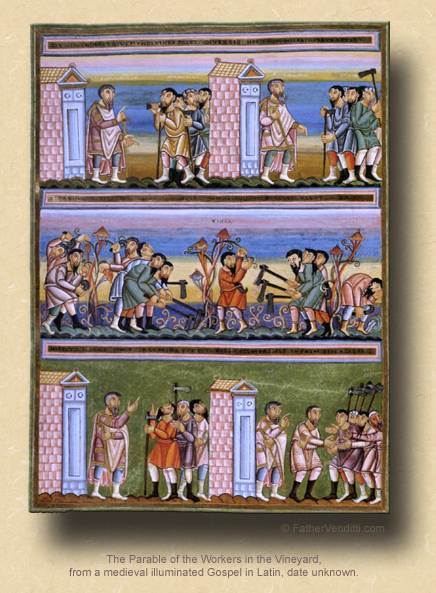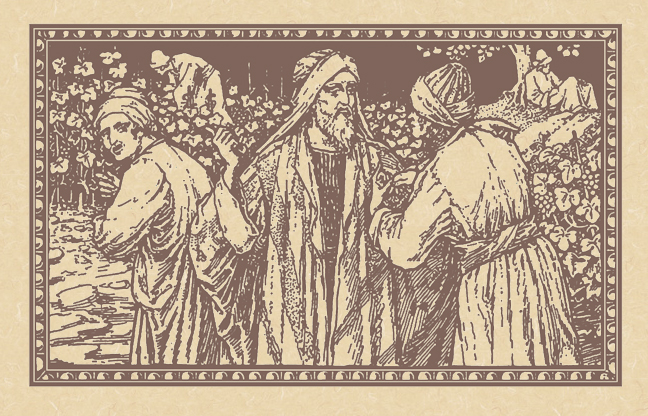It's No Trick to Make the Gospel Say What You Want It to Say, but That Doesn't Make It Right.
The Twentieth Wednesday of Ordinary Time; or, the Memorial of Saint Rose of Lima, Virgin.*
Lessons from the primary feria, according to the ordinary form of the Roman Rite:
• Judges 9: 6-15.
• Psalm 21: 2-7.
• Matthew 20: 1-16.
|
When a Mass for the memorial is taken, lessons from the feria as above, or from the proper:
• II Corinthians 10: 17—11: 2.
• Psalm 148: 1-2, 11-14.
• Matthew 13: 44-46.
…or, any lessons from the common of Virgins for One Virgin.
|
The Third Class Feast of Saint Philip Benizi, Confessor.**
Lessons from the common "Justus ut palma…" of a Confessor not a Bishop, according to the extraordinary form of the Roman Rite:
• I Corninthians 4: 9-14.
• Psalm 36: 30-31.
• Luke 12: 32-34.
The Otdanije (Leave-Taking) of the Dormition.***
Lessons from the pentecostarion, according to the Ruthenian recension of the Byzantine Rite:
• II Corinthians 6: 11-16.
• Mark 1: 23-28.
FatherVenditti.com
|
 9:13 AM 8/23/2017 — We would not be fooling anyone—except ourselves—were we to pretend to agree with the behavior of the landowner in the parable our Lord tells us in the Gospel lesson. Those who worked no more than an hour get the same pay as those who worked all day. How is that fair? It isn't, because fairness is not a Christian virtue. The fact that most people think it is betrays the extent to which we've allowed our understanding of our own faith to be corrupted by purely social human ethics. 9:13 AM 8/23/2017 — We would not be fooling anyone—except ourselves—were we to pretend to agree with the behavior of the landowner in the parable our Lord tells us in the Gospel lesson. Those who worked no more than an hour get the same pay as those who worked all day. How is that fair? It isn't, because fairness is not a Christian virtue. The fact that most people think it is betrays the extent to which we've allowed our understanding of our own faith to be corrupted by purely social human ethics.
A lot of people make the mistake—or, rather the rationalization—of focusing exclusively on the landowner's punchline at the end of the parable: …an oculus tuus nequam est, quia ego bonus sum? The translation we have here, from the New American Bible, is boilerplate; both the Greek† and the Latin are much more colorful, and Msgr. Knox gives us an exact translation: “Must thou give me sour looks, because I am generous?” (Matt. 20: 15 Knox). And so, those uncomfortable with the actual point of our Lord's parable find an easy way to skirt the issue by using that last line to dilute our Lord's message to one of the necessity of being generous, which fits in with the program of the moderns of distilling the entire Gospel of Jesus Christ to a mere program of social justice: the whole point of Christianity is loving one another and being kind to one another and caring for the poor and the needy and running soup kitchens and blood drives and having our children save their nickles and dimes during Lent to feed the hungry and—according to their interpretation of today's Gospel lesson—promoting the ethics of justice and equality in society.
But the landowner in the parable is not the villain; he's the hero, in much the same way that the father in the Parable of the Prodigal Son is the hero in spite of the fact that his treatment of his elder son is also very unfair. A week ago today, when we looked at the Parable of the Unforgiving Servant who refused to forgive his fellow servant even after he, himself, had been forgiven of a much larger debt, we were confronted with the uncomfortable thought that what we so often refer to as the “Judeo-Christian” ethic has nothing to do with the Gospel of Jesus Christ. It is the paradox of our times: that what everyone thinks Christianity is all about simply cannot be found in the pages of the Holy Gospel.
We can try, as many do, to pull one or two lines from a Gospel lesson and use that to try and make the passage be about what we've already decided we want it to be about, as in the case of today's Gospel.  Do that enough, and the Gospel is reduced to nothing more than a self-help book that could have been written by Doctor Phil; indeed, for many Christians—even for many Catholics—that's all it is: Jesus teaches us how to be nice to each other … period. Do that enough, and the Gospel is reduced to nothing more than a self-help book that could have been written by Doctor Phil; indeed, for many Christians—even for many Catholics—that's all it is: Jesus teaches us how to be nice to each other … period.
The point of our Lord's parable is not that it's important to be generous with our money; the point is that how God chooses to deal with us as individuals has no relationship to how he chooses to deal with someone else, which is none of our business. Forgive me for pointing it out, but there is a Commandment about envy. We typically interpret it in terms of coveting our neighbor's material goods, but it applies to our neighbor's relationship to God as well. When we presume that God's treatment of us is unfair because we perceive that he's treated someone else differently, we've “Doctor Philled” the Gospel. We focus so much on our membership in the community of the Church, that we often forget that our relationship to Christ is a deeply personal one. The real punchline in today's Gospel lesson, if you want one, is the not the line “Are you envious because I am generous?” (20: 15 NABRE), but the line “My friend, I am not cheating you. Did you not agree with me for the usual daily wage? Take what is yours and go” (vs. 13 & 14 NABRE).
The longer I hear confessions, the more I am convinced that the greatest struggles we face in the interior life are not temptations of the flesh or distractions in our prayer or dark nights wherein our faith is tested; the greatest damage to interior peace and union with Christ come from comparing ourselves to others. That was the problem with the Pharisee in the Temple: “Lord, I thank Thee that I am not like this publican…” (cf. Luke 18: 11). What kind of prayer is that? What would have been worse is if the publican had said, “Lord, why can't you give to me what you've given to the Pharisee?” He can thank God that he didn't, since we know that the prayer of the Pharisee was not pleasing to God.
Let us pray that all of our prayers will be pleasing to God, and that we will cultivate a deeply personal relationship to our Lord, God and Savior, Jesus Christ, enlivened by our personal prayer, and nourished by our reception of the Most Holy Sacrament of the Altar.

* The first saint of the western hemisphere, Isabel Flores de Oliva (1586-1617) was born in Lima. Known as a mystic and nick-named "Rose" because of her beauty, she admired St. Catherine of Siena and became a Dominican tertiary at the age of twenty, living a life of monastic solitude. She is the patroness of both the Philippines and of all South America, particularly her native Peru.
** Born of a noble family, Philip Benizi entered the Order of Servites as a lay brother, but was later ordained to the Holy Priesthood and was eventually elected Superior General of his order, giving a splendid example of humility.
*** In the Byzantine Tradition, major feast days are marked by prefestive and postfestive periods. While there is no corresponding tradition in the West regarding prefestive days, the postfestive period is concomitant with the concept of an octave in the Latin Church, though it's duration is not necessarily eight days depending on the importance of the feast. The last day of the postfestive period is called the "Leave-Taking," Otdanije in Slavonic, actually a verb meaning "to return." The liturgy on the day of Otdanije mirrors that of the feast with minor variations.
The feasts of the Holy Martyr Lupus and of the Holy Martyr Irenaeus, Bishop of Lyon, ordinarily observed on this day, were transferred to yesterday because of the Leave-Taking.
† “…ἢ ὁ ὀφθαλμός σου πονηρός ἐστιν ὅτι ἐγὼ ἀγαθός εἰμι….”
|

